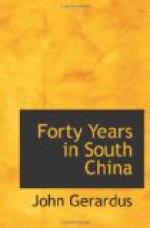The first plan suggested (perhaps we should say mentioned for it is not advocated), we take to be that the missionaries become not only members of the ecclesiastical judicatories formed on mission ground, but also amenable to those judicatories in the same way, and in every respect, as their native members, their ecclesiastical relation to their home churches being entirely severed. This plan ignores the actual relation of missionaries to their home churches, as spoken of above. Surely the home churches cannot afford this.
Perhaps we should notice another plan sometimes acted on, but not mentioned in the letters we have now received. It is that the missionaries become members of the Mission Church Judicatories as above; but that these Judicatories be organized as parts of the home churches, so that the missionaries will still be under the jurisdiction of the home churches through the subjection of the Mission Judicatories to the higher at home. This plan can only work during the infancy of the mission churches, while the Mission Church Judicatories are still essentially foreign in their constituents. Soon the jurisdiction will be very imperfect. This imperfection will increase as fast as the mission churches increase. Moreover this plan will extend to the native churches the evil deprecated above.
The second plan suggested we take to be that the missionaries, while they remain the agents of the home churches, should retain their relation respectively to their home churches, and have only an advisory relation to the Presbytery on mission ground. This is greatly to be preferred to the first plan suggested. It corresponds to the relation of missionaries to their respective home churches. It takes into consideration also, but does not fully correspond to the relation of the missionaries to the churches on mission ground, at least does not fully correspond to the relation of the missionaries to the native churches at Amoy. Our actual relation to these churches seems to us to demand that as yet we take part with the native pastors in their government.
The peculiar relationship of the missionaries to Tai-hoey, viz., having full membership, without being subject to discipline by that body,—is temporary, arising from the circumstances of this infant church, and rests on the will of Tai-hoey. This relationship has never been discussed, or even suggested for discussion in that body, so that our view of what is, or would be, the opinion of Tai-hoey on the subject we gather from the whole character of the working of that body from its first formation, and from the whole spirit manifested by the native members. Never till last year has there been a case of discipline even of a native member of Tai-hoey. We do not know that the thought that occasion may also arise for the discipline of missionaries, has ever suggested itself to any of the native members. If it has, we have no doubt they have taken for granted that the discipline of missionaries belongs to the churches which have sent them here. But we also have no doubt that Tai-hoey would exercise the right of refusing membership to any missionary if necessary.




